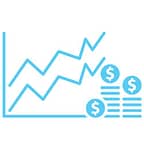It is a question we receive on a regular basis from Canadian investors: Should I Invest in ETFs? The answer for a majority of investors is a resounding yes! ETFs or Exchange Traded Funds are an excellent way to diversify your holdings while providing exposure to a wide range of different assets.
There is no secret to long-term investing. Buying ETFs is a great way to invest in multiple different companies or even an entire index. It also mitigates downside risk and allows you to collect dividends while also seeing long-term capital growth.
Does that sound good to you? Investing in ETFs has long been seen as a boring way to invest. Truth be told, if you are younger and have a longer investing horizon, then you can afford to take some risks. But for most investors who earn an income that allows them to invest each month, buying passively managed, low-cost ETFs is a great way to build your wealth for the long haul.
What are ETFs? Should I Invest in ETFs?

ETFs or Exchange Traded Funds are organized and managed funds that trade directly on the market like stocks. You can buy shares of the ETF, trade options on them, and even day trade them if you like. ETFs trade exactly like stocks except you gain exposure to a basket of stocks rather than just investing in one specific company.
There are multiple different types of ETFs that you can invest in. Some will track entire indices or sectors, while others will track a certain trend. As with stocks, it can often be a benefit to diversify your ETF holdings. One thing to watch out for: many ETFs have similar holdings so make sure to look at which stocks or assets each ETF holds before buying!
Is Buying ETFs a Good Investment?
Here at SavvyCanadianFinance, we like to preach that any investment is better than no investment at all. You do not have to be a day trader to have exposure to the stock market. In fact, for most people, you are much better off buying a diversified portfolio of stocks and ETFs and then leaving them forever. Over time, investing in good companies is the best way to outperform the Toronto Stock Exchange or any other market.
So is buying ETFs a good investment? No matter what kind of investor or trader you are, every portfolio has room for ETFs. This is especially true if you do not want to log in to trade stocks every day, or if you just want to let time and compound growth work their magic.
Now, here is the kicker when it comes to buying ETFs: the gains might not be as much as if you buy individual stocks. But as I already mentioned, ETFs allow you to defend your portfolio against risk to the downside. You can even buy different types of ETFs to hedge your portfolio against volatility. Some people might think they are boring, but ETFs can provide you with a surprising amount of flexibility!
What is the Downside to ETFs?

As with any investing asset, there is always a downside. ETFs, come with fees whereas stocks do not. You have to pay a fee, usually on an annual basis, called an MER or Management Expense Ratio. This is a percentage of your total investment and is how ETF providers make money. Since most ETFs are passively managed by fund managers, the MER for ETFs is much lower than the fees for Mutual Funds which are actively managed.
The performance of ETFs can also leave some investors wanting more. When you invest in ETFs, typically you are playing the long game. Your gains will compound over time but it can take years to get there. Stocks can rise and fall by the day depending on how volatile they are. Remember, your ETF could hold some high-flying stocks like Tesla (NASDAQ: TSLA), but that does not mean your ETF position will rise as much as the stock does during a given session.
ETFs can also bump up your income when it comes to tax season. You can buy ETFs in a TFSA or Tax-Free Savings Account. But if you own a dividend-paying ETF in a non-registered account you are on the hook for those dividends as capital gains.
Are ETFs Good for Beginners?
Warren Buffett once said that for most investors, owning low-cost, broad index tracking ETFs is the best way to invest for the long term. Buffett himself owns significant positions in the two S&P 500 ETFs: VOO and SPY. So if the Oracle of Omaha recommends ETFs for most investors, that’s good enough for me!
For those just getting started in investing, owning index ETFs is a great way to add immediate diversification to your portfolio. Add some more to your positions each month and watch them grow exponentially over time. Now, there are going to be some years, like 2022, when the S&P 500 underperforms. It happens! Since its inception in 1957, the S&P 500 has provided returns in the neighbourhood of 10% on an average annual basis.
As a new investor, choosing individual stocks can be a daunting task. While you are learning more about researching individual companies, jump into the market with ETFs as an excellent way to start your investing journey!
I hope this helps you think about ETFs as an investment asset in 2023.
Stay savvy!
